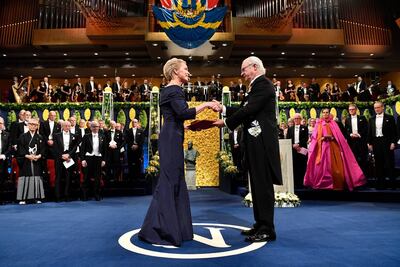Science is expected to take centre stage at the 2020 Nobel prize awards as the world battles the coronavirus pandemic.
The most obvious change to the programme for the awards in the sciences, economics and literature is the cancellation of the traditional presentation ceremony in Stockholm. The separate Peace Prize ceremony in Oslo will be held in a scaled-back version.
However, there are also more profound changes affecting what the Nobels mean in a world confronted not just by the present threat of Covid-19 but also by the looming climate crisis.
Ahead of the awards, Nobel Foundation head Lars Heikensten has said the pandemic is a crisis “for all of humanity”.
“It illustrates how important science is," he added.
Nobel historian Asle Sveen told The National that this year's awards would be unique and the impact of Covid-19 and climate change would doubtless have a bearing.

“The pandemic is very serious but climate change is much more serious,” the former Oslo University academic said. “You have to have global co-operation to fix this.”
Divining who will win the prizes in physics, medicine, chemistry and economics is complicated. The awards are usually given to individuals and teams that excel in their fields but are relatively unknown to the public.
The awards in the sciences also tend to be given for discoveries made a number of years prior that have gone on to have immense impact.
Nevertheless, the virus could have influence the committees for this year’s awards and Web Science, which correctly predicted the chemistry laureates in 2019, has spotted some potential winners whose work has impacted the world of vaccine science.
In an unparalleled scientific effort, experts around the world are racing to find a shot to prevent Covid-19.

Pamela Bjorkman, a professor of biology at the California Institute of Technology, and Jack Strominger from Harvard University have been tipped as potential winners of the Medicine prize.
Their landmark discovery of specific proteins has gone on to have applications in drug and vaccine development.
For Chemistry, professors Taeghwan Hyeon at Seoul National University, Moungi Bawendi at MIT and Christopher Murray at the University of Pennsylvania have been identified as possible laureates.
The trio’s synthesis of nanocrystals has gone on to have a wide range of uses in a number of medical systems.
There are also indications the high-profile Nobel Peace Prize will be influenced by the pandemic.
Mr Sveen said the international NGO Reporters Without Borders was a strong contender for the peace prize. The Paris-based group defends press freedom around the world as well as campaigning to raise public awareness of abuse against journalists to secure their safety and liberty.
The historian said there was an obvious need for journalists to be safeguarded not just because of information spread during the pandemic but in the many conflicts around the world.
“Of course it is really important with all the fake news and disinformation around the world. It is really important to have correct information. This is a very dangerous occupation to have. This year more than 20 journalists have been killed,” he said.
The chances of Greta Thunberg, the schoolgirl climate change activist, winning the Nobel Peace Prize could also be enhanced by the importance of the science and the pandemic at this year’s awards in Stockholm.
“This is a long term and much more dangerous problem than the pandemic,” Mr Sveen said. “But you can link them.”
“No other person has been in the spotlight more or has got more attention [for climate change] than Greta Thunberg,” he added.
When the peace prize is awarded in person this year the impact of the coronavirus will be all too obvious. Only 100 people will be present at ceremony in Oslo, which will also not be held in its normal venue.
The traditional prize ceremony in December in Stockholm has been cancelled due to the pandemic, replaced with a televised broadcast showing laureates receiving their awards in their home countries.
The medicine prize kicks off the announcements on Monday, followed by physics on Tuesday, chemistry on Wednesday, literature on Thursday and peace on Friday. The economics prize wraps things up on Monday, October 12.

